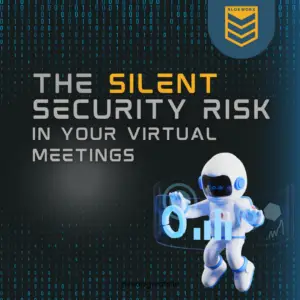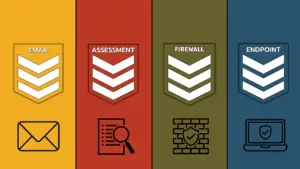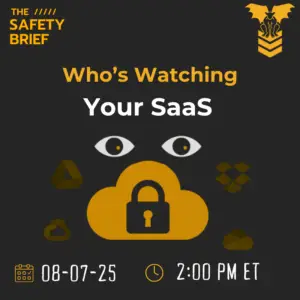In today’s fast-paced business environment, AI meeting assistants like Microsoft Copilot, Otter.ai, and Fireflies.ai have become increasingly popular tools for capturing and summarizing discussions. These digital scribes promise enhanced productivity, perfect recall, and the elimination of manual note-taking. However, beneath their convenience lies a concerning set of security and compliance risks that many organizations overlook.
The Rising Trend of AI Notetakers
The adoption of AI meeting assistants has skyrocketed in recent years. According to recent industry data, the market for AI meeting tools is growing at over 30% annually, with more than 70% of enterprise organizations experimenting with or implementing these technologies.
These tools offer compelling benefits:
- Automated transcription and summarization
- Action item extraction and assignment
- Meeting analytics and insights
- Searchable conversation archives
However, as with many rapidly adopted technologies, security considerations often lag behind implementation.
The Hidden Security Risks
- Persistent Access and Permission Creep
Unlike human participants who leave when a meeting ends, AI notetakers maintain persistent access to your calendar, meetings, and in many cases, your entire communication ecosystem. This creates several critical security issues:
- Calendar Integration: Most AI notetakers require calendar access to automatically join meetings, which grants them visibility into your entire schedule, including confidential appointments.
- Access Propagation: When you add an AI assistant to one meeting, many tools automatically join ALL future meetings without explicit permission for each session.
- Difficult Removal: Many users report significant challenges in fully revoking access once granted. According to cybersecurity researcher documentation from Fordham University, “Using AI notetakers that fail to notify participants can lead to privacy violations, legal risk, and loss of trust, especially when dealing with external partners or customers.”
- Data Processing and Storage Concerns
AI notetakers don’t just listen – they process, analyze, and store your conversations:
- Third-Party Processing: Your meeting content is typically processed on the vendor’s servers, not within your security perimeter.
- Training Data Risks: Some tools use meeting content to train and improve their AI models, potentially exposing sensitive information.
- Data Retention: Many services store meeting data indefinitely by default. According to security experts at Fellow.app, “The longer the tool has your data, the more data can be revealed in the case of a breach.”
- Cross-Tenant Vulnerabilities: In multi-tenant SaaS environments, configuration errors could potentially allow data leakage between customers.
- Regulatory Compliance Issues
AI notetakers create significant compliance challenges across multiple regulatory frameworks:
- Consent Requirements: Many jurisdictions require notification or consent before recording conversations. AI tools that join automatically may violate these laws.
- HIPAA Violations: Healthcare discussions captured by non-compliant AI tools constitute a clear HIPAA violation.
- GDPR Considerations: European data protection laws require specific controls for processing personal information, including voice data.
-
Industry-Specific Regulations: Financial services, legal, and government entities face additional regulatory hurdles when using these tools.
Real-World Risks and Incidents
While specific breach statistics for AI notetakers are still emerging, several concerning patterns have been observed:
- Unauthorized Access: Reports of AI assistants joining highly sensitive meetings without explicit invitation, including HR disciplinary discussions and strategic planning sessions.
- Compliance Failures: According to McLane Middleton, a legal firm specializing in privacy law, many organizations using AI notetakers are failing to comply with two-party consent laws for recording.
- Data Leakage: Instances of meeting content being accessible to unauthorized parties due to misconfiguration or permission issues.
- Integration Vulnerabilities: Security researchers have identified potential attack vectors through the calendar and meeting platform integrations these tools require.
The DCS security blog notes that “The risk of data breaches and unauthorized access to sensitive information, such as trade secrets and personal employee information, cannot be overstated” when discussing AI meeting tools.
Best Practices for Secure Implementation
Despite these risks, AI notetakers can be valuable productivity tools when implemented securely. Here are essential best practices:
- Establish Clear Governance Policies
- Create explicit guidelines for when AI notetakers can and cannot be used
- Develop a formal approval process for new AI tools
- Define clear data classification policies to identify meetings too sensitive for AI assistants
- Implement Technical Controls
- Configure meeting platforms to clearly identify AI participants
- Establish a monitoring system to detect unauthorized AI participants
- Use access control lists to restrict which meetings can include AI tools
- Enable end-to-end encryption where available
- Conduct Proper Vendor Assessment
Before implementing any AI notetaker, conduct thorough due diligence:
- Verify SOC 2 Type II compliance at minimum
- Assess GDPR and CCPA compliance capabilities
- Review data processing agreements carefully
- Evaluate data retention and deletion policies
- Confirm they’re not using meeting data to train general AI models
- Train Users on Safe Practices
- Educate all employees on the risks of AI meeting assistants
- Provide clear instructions for controlling access permissions
- Establish protocols for sensitive discussions
- Create standard language for notifying participants about AI presence
- Monitor and Audit Usage
- Regularly review which AI tools have access to your systems
- Audit meeting recordings and transcripts for sensitive information
- Implement a process for revoking unnecessary access
- Conduct periodic security assessments of your meeting ecosystem
The Human Element Remains Critical
While AI notetakers offer impressive capabilities, they should augment rather than replace human judgment in sensitive discussions. Consider these guidelines:
- Selective Implementation: Use AI assistants only for appropriate meeting types
- Hybrid Approach: Combine AI tools with human review for sensitive content
- Explicit Notification: Always inform participants when AI is present
- Pause Function: Know how to temporarily disable recording for sensitive segments
Protect Your Organization with BLOKWORX
As AI meeting assistants become increasingly integrated into everyday workflows, organizations need comprehensive protection that extends beyond traditional security boundaries to include SaaS applications and AI tools.
BLOKWORX’s Managed Cloud & Email Security provides critical protection for your entire communication ecosystem with key security functions including:
- MX Record Email Filtering: Blocks malicious content before it reaches your environment
- SaaS File Monitoring: Detects unauthorized access to sensitive documents
- Email Encryption: Ensures confidential meeting discussions remain protected
- Anti-Phishing Protection: Guards against credential theft that could compromise meeting access
- SaaS Account Login Monitoring: Detects suspicious access to services where AI tools operate
- SIEM – Email & Account Activity: Provides visibility into how AI tools are accessing your systems
- SOAR – Email & Account Activity: Automates responses to unusual behavior patterns
- Business Email Compromise Prevention: Stops attackers from accessing meeting platforms
- Anti-Spam Protection: Filters out unwanted communication channels
- Manual O365 DLP Controls: Prevents sensitive information from being shared inappropriately
These comprehensive security functions create multiple layers of protection against the risks posed by AI meeting assistants and other cloud-based tools, ensuring your organization can safely leverage productivity enhancements without compromising security.
Take Action Today
Don’t wait for a security incident to expose gaps in your AI governance. Contact BLOKWORX today for a comprehensive assessment of your organization’s SaaS security posture, including risks associated with AI meeting assistants.
Request a Security Assessment →





